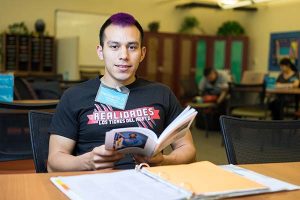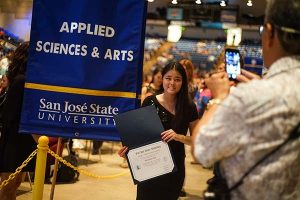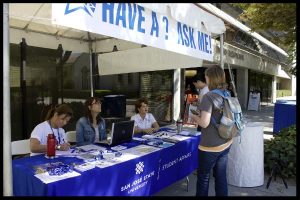
Photo: James Tensuan
Junior Film student Heriberto Zavala works in Peer Connections, a support service that provides peer mentoring, peer tutoring and supplemental instruction.
By David Goll
Peer Connections, a program offering holistic academic support to students, is playing an integral role in efforts to improve the rate of student success at San Jose State University.
Deanna Peck, Peer Connections director, is hopeful about expanding and enhancing their services in coming years. Having been hired to improve and expand the program five years ago, Peck has seen the number of tutors, mentors and supplemental instruction leaders increase from 25 two years ago to 60 this spring. That could double to 120 by fall with more funding.
The services are aimed at helping students not only survive but also thrive throughout their college experience, especially in difficult classes with high-failure rates or first-year classes through which students are learning what it means to be a Spartan. University officials expect Peer Connections will provide significant support as part of the Clearing Bottlenecks initiative — one of SJSU’s Four Pillars of Student Success adopted by the university to improve the student experience while also keeping students on track to graduate in four years for first-time freshmen or two years for transfer students. Currently, the average time is 5.2 years for first-time freshmen.
Peck said tutors generally work with students on class content, while mentors focus on assisting students with study strategies, time and stress management issues. Supplemental instructional leaders are assigned to facilitate study sessions for classes with high failure rates.
“San Jose State’s current emphasis on peer education and leadership is exemplary,” Peck said. “It’s an exciting time for the program.”
Tutors and mentors who work in classrooms or the spacious study area inside the Student Services Center earn more than minimum wage and average 9 to 12 hours a week on the job.
Lauren Cordova, a peer mentor, behavior science major and one of this year’s outstanding graduating senior recipients, said she works with many student athletes grappling with time and stress management issues. Michael Fashola, a chemistry major and peer tutor, said he fields many questions from students in chemistry classes about specific problems from lectures or homework. Sonnan Naeem, a peer tutor and anthropology major, said he finds satisfaction guiding fellow students as they work through some of the same problems he had earlier in his academic career.
Having already dropped a physics class at Ohlone College in Fremont, student Haider Syed said he knew when he transferred to SJSU in fall 2014 he would need help from tutors for such classes as physics and calculus. The former engineering major found Peer Connections online his first semester, but also saw presentations about it in classes.
“About a month into my first semester, I started using tutors,” Syed said, adding he has continued to do so off and on. “One semester, I had help from four tutors for three courses.”
Though Syed switched his major to business, he still uses tutors two hours a week.
“The tutors are there to help me,” he said. “I make a note of a problem I have during a class and discuss it with them. I bring my textbooks if I have a homework problem I don’t understand. I can pass these classes on my own, but I feel tutors have helped me get higher grades.
Ingrid Salazar, a junior majoring in environmental studies who transferred to SJSU last fall, brings homework to the Student Services Center an hour before an appointment with a tutor.
“It provides a nice, quiet area to study,” Salazar said. “The free breakfast is nice, too.”
She learned about Peer Connections from a classmate. Several weeks into the fall semester Salazar said she wasn’t faring well in pre-calculus. Vowing not to fail a class, she started working with tutor Jacky Cheng, a chemical engineering student.
“He helped me quite a bit,” Salazar said. “He took things slowly and deliberately, going step by step. I needed that.”
Salazar noted she felt overwhelmed at times in her class.
“I kind of felt like I was drowning,” she said. “Jacky was very calm in his approach. He provided me a lifeline in that class.”
She’s working with him again this semester after struggling with a chemistry class. Salazar said the help she has received from tutors will assist her in graduating on time. She hopes to join the Peace Corps.
Another student who frequently visits Peer Connections to study and improve his skills and gain confidence is Martin Tran, a junior majoring in Creative Arts. He heard about the program on a campus tour. Like Syed and Salazar, he has worked with tutors, but also mentors.
“This is a great place for me because I’m able to get help on assignments,” Tran said, adding he receives assistance on study skills to prepare to take upper division courses as a disabled student.
“We reflect on assignments, we attempt to solve problems together, we communicate often via email. Tutors prepared me well when I took the writing skills test to get into upper division (courses) and meet a graduation requirement.”
University officials allocated $2.8 million for clearing bottlenecks during the 2016-17 and 2017-18 academic years – classes that have long wait lists that are a prerequisite to make progress toward degree as well as courses with high-failure rates.
It may already be bearing fruit. The number of units taken by both the overall student body and among new students has seen a slight uptick, according to Dr. Stacy Gleixner, SJSU’s interim associate vice president for Studen t and Faculty Success.
“We’re focused on providing greater access to classes and improving student performance in high-failure rate classes,” Gleixner said.
According to university statistics, the average unit load (AUL) for all SJSU undergrads last fall was 12.7 units, compared to 12.4 for the fall 2015 semester. Students who attempted to take a full semester load of 15 units increased significantly last fall compared to a year before: from 18 percent to 33 percent among freshman, 28 percent to 36 percent among sophomores, 28 percent to 31 percent among juniors and 29 percent to 31 percent among seniors. Among new transfer students at SJSU, it increased from 14 percent to 20 percent.
A 2015 study by the Public Policy Institute of California spurred action on this issue not only by SJSU and California State University leaders but by members of the state legislature. It predicted a shortage of a million workers with bachelor’s degrees by 2025, and another deficit of 500,000 workers with at least some college course work.
High-failure rate classes exist in every college. Sometimes high failure rates in classes can be an issue of technology, while at other times, students struggle because they lack the proper background and prerequisites to succeed in a difficult course, Gleixner said. Her team is working to increase awareness of the tutoring, mentoring and supplemental instruction services offered by Peer Connections while seeking out additional funding to expand services.

